IOS Organises Two-day International Conference on “The Role of Women in making a Human Society”
September 23-24, 2017 at Calicut (Kerala)
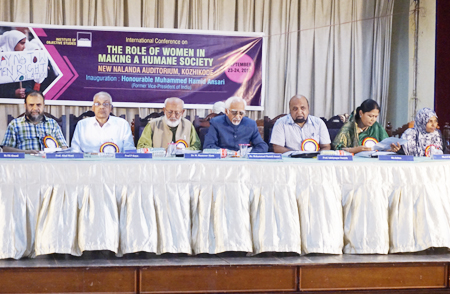
A two-day international conference on the “The Role of Women in Making a Humane Society” was organised by the Institute of Objective Studies (IOS) on September 23-24, 2017 at Calicut (Kerala). The conference was a big success in the sense that women, who were in the focus, registered their presence in large numbers. Women delegates came from several parts of India and abroad and accounted for three-fourths of the attendees. The zest of the participants was so overwhelming that they virtually stormed into the venue.
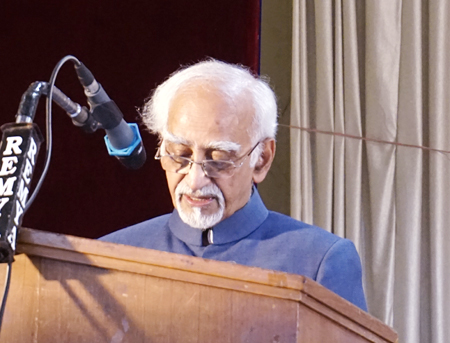
The former Vice-President of India, Mohammad Hamid Ansari, who inaugurated the conference on September 23 last, was amazed to see the venue, New Nalanda Auditorium, packed to capacity. In his inaugural speech, Ansari said that women constituted about half of human kind and should, therefore, share the same responsibilities as men. He opined that a society would be considered humane if it was motivated by the most desirable of human values. It implied a society dedicated to the principles of justice, equality and fraternity, and the one in which its members were recognised and respected as human beings without differentiation of religion, race, caste, sex or place of birth. This, in relation to the female half of humankind, implied that women got justice, equality and fraternity in equal measure in societies they lived in. He questioned if this corresponded to reality.
Quoting data published by the UN Women, Ansari said that gender inequality was a major cause and effect of hunger and poverty. About 60 per cent of the chronically hungry people were women and girls. Similarly, women made up more than two-thirds of the world’s 796 million illiterate people. He noted that almost 70 percent of employed women in South Asia worked in agriculture, as did more than 60 per cent of the employed women in sub-Saharan Africa. In most countries, women in rural areas who worked for wages were more likely than men to hold seasonal, part-time and low-wage jobs. He said that women also received lower wages for the same work. Besides, a large gender gap remained in women’s access to decision-making and leadership. He also quoted from the June 2015 report of the high level-committee on the status of women in India headed by Prof Rajput, which said “Indian women are born into and raised in a socio-cultural environment that is highly discriminatory, patriarchal and hierarchal, in which economic, political, religious, social and cultural institutions are largely controlled by men. This environment has evolved over centuries through various social practices and institutions that are governed by patriarchy. Through a combination of family, caste, community and religion, among others, patriarchal values and ideas are constantly reinforced and legitimised.”
Ansari held that the rights of citizens were enshrined in India’s Constitution. It not only granted equality to women and prohibited discrimination, but also recognised their marginalisation and empowered the state to adopt measures of positive discrimination in their favour. This had been reinforced by the Supreme Court which held that the equality clause did not speak of mere formal equality before law, but embodied the concept of real and substantive equality which was an essential ingredient of social and economic justice. As against this, he said, the gender inequality index of the 2016 Human Development Report of UNDP ranks India at 125 in a list of 159 countries.
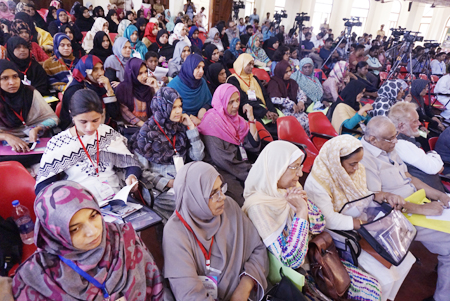
He stated that a number of academic and field studies were available on the general condition of Muslim women as well. One study examined them in three categories: education, workforce participation and social mobility. According to the study on education, in 2009-10, 34 per cent (rural) and 19.8 percent (urban) Muslim women never attended school. While 19 per cent (rural) and 11 per cent (urban) had illiterate husbands, less than 10 per cent completed education. He said that according to the data available on workforce participation, out of the total Indian women who participated in the workforce, 70 per cent were Hindu women and 29 per cent Muslim women. Two-thirds of Muslim women were self-employed or engaged in home-based labour and had a low level of earning. The data on social mobility says 75 per cent women need their husband’s permission to engage in almost any activity. Men were unaware of government schemes and only 20 per cent had access to media.
The former Vice President observed that the principle of equality and justice between men and women in terms of their rights and obligations is emphatically stated in surah Al-Ahzab. It was to be noted that Islam made no distinction between secular and religious duties. He said that a woman had to be respected, adding that the equality bestowed by faith was diluted or denied by tradition and practice and replaced by subordination. An obvious result of this was overt or covert misogyny so vividly reflected in proverbs relating to women in most languages in use in Muslim societies. He remarked that our present effort through affirmative action initiatives of the government or through voluntary initiatives, was to produce equity of varying degrees rather than substantive equality.
He said that the challenge was to produce substantive gender equality so that women became active and equal partners in the creation of a humane society. The first step in this direction was to be taken with the girl child, with her nourishment, education and inculcation of a sense of equality. Each of these had to be given adequate weight. The principal responsibility for this lay with parents, but for this to happen meaningfully the social ambience and attitude of the husband had to change accordingly The traditional societal bias towards a patriarchal relationship in the family had thus to give way to a relationship of equal partners, he said. The next step was at the nursery, primary and secondary school level where gender equality had to be practised and be a part of the curricula. The human potential for learning and excellence had no gender and class ceiling. Experience showed that given opportunity, the most deprived in both sexes could scale the heights of excellence.
Ansari maintained that there was also the question of preparing the younger generation for participation in workforce and for requisite career planning. He said that according to World Bank data, women’s participation was only 27 per cent for India as against 51 in Indonesia 49 in Malaysia, 43 in Bangladesh, 30 in Sri Lanka and 25 in Pakistan. There was surely considerable room for improvement. Such an improvement would be in consonance with requirements of faith and necessitated individual and community effort, he concluded.
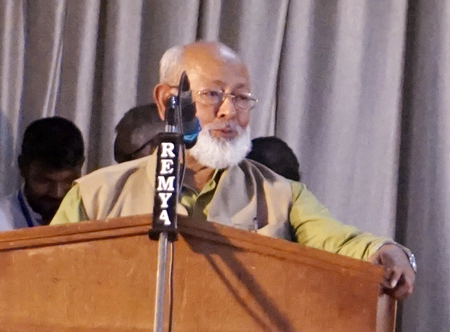
Presiding over the conference, IOS chairman, Dr. Mohammad Manzoor Alam said that society had to move beyond the ascriptive role of women, which was resented by better-educated women. Such roles often showed the lack of enlightenment in society. Women were not devis (deities) to be worshipped in temples, but fellow human beings to be treated with respect and dignity. He observed that for women to effectively play a role in making a humane society that Islam demanded, the society had to empower them.
Incidentally, empowerment had been a favourite subject of study at the IOS, he said. A few years ago, the Institute brought out a set of seven books on empowerment of Muslims, including one about the empowerment of Muslim women. He maintained that nobody who was disempowered could create value, or make great social change. The world was and, had been, led and changed by free, powerful persons. Slaves could not do much. If women were treated like slaves, they could not be expected to play a great role. He asserted “our excesses against our women have caused us great public humiliation with the Supreme Court judgment on the issue of triple talaq. Because of our own folly our legal and constitutional defences have been breached, making it easier for the state to interfere in our family laws”.
Dr. Alam observed that there were serious issues of representation of Muslim women in social, public and political life of the country. To be effective builders of a new world, the New Muslim Woman had to be given agency (she had to be an agent of her own free will). She must be armed with the finest knowledge. From the late 19th century to the early 20th century, several Muslim women rose in the sub-continent to become leaders of girls’ education movement across the country. These included Khujista Suhrawardy, mother of undivided Bengal’s chief minister and later Pakistan’s prime minister, Syed Hasan Sayeed Suhrawardy. Then there was Rokayya Showkat Hussein, wife of an ICS officer from pre-partition Bengal, who led a great movement for Muslim women’s modern education and built institutions. He stated that Muslim girls deserved the best education, training and freedom to be great leaders in the movement to build a humane society.
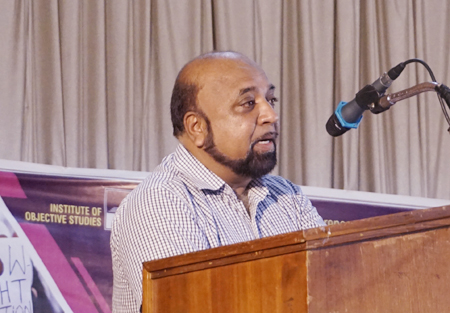
Earlier, the conference began its deliberations with the recitation of a verse from the Holy Qur’an. While finance secretary, IOS, Prof Ishtiyaque Danish.
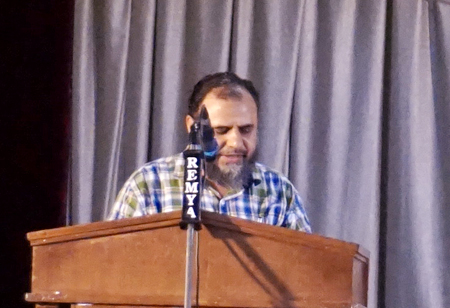
Introduced the theme of the conference, Prof. Afzal Wani of GGS IP University, Delhi and Assistant Secretary General, IOS, presented the keynote address. Prof. Wani held that the question of women’s role in society had become paramount in today’s context. Explaining the importance of role of women, he said that it was none else but the sister of the second caliph of Islam, Hazrat Omar who brought him towards Islam. We had to understand the role of mominaat and momineen for understanding the potential of men and women in making society humane. He expressed the belief that all conflicts of today’s world – social and economic – could be resolved with the cooperation of women.
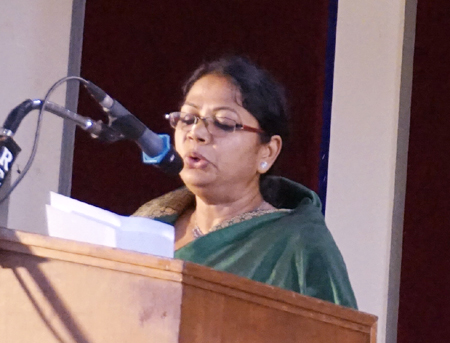
Tamil novelist from Chennai, Salma, one of whose novels has been translated into English, said that she too faced a situation similar to other women in society. In Tamil Nadu, girls under 18 years of age were married in the name of Islam. Women were still very low on the index of development. She opined that the community had landed in trouble due to the wrong interpretation of Islamic texts. She pooh-poohed the BJP’s false propaganda about talaq. She pleaded for a dialogue on the pitiable condition of women. AS Zainaba, who spoke in Malayalam, also put forth her views on the role of women in social uplift. The inaugural session was marked by the release of the book “Empowering Women: Paradigms and Strategies” edited by P Koya, by the chief guest, Hamid Ansari. While Prof P Koya, Coordinator, Calicut chapter of IOS, welcomed the delegates, the Secretary of the chapter, AA Vahab, extended a vote of thanks.
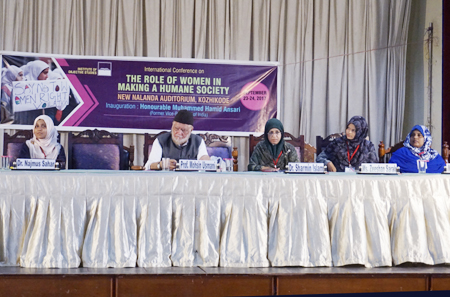
Business Session I
The first day of the conference was divided into three business sessions. The first business session, devoted to the theme “Women in the time of the Prophet”, was presided over by Prof. Mohsin Usmani. Dr. Najmus Sahar, guest faculty, Deptt. of Islamic Studies, Jamia Millia Islamia, New Delhi, presented her paper on “Social Permissions become Taboo for North Indian Muslim Women: Reading of Religious Texts”. In her paper, she said that Muslims were educationally backward and economically deprived. People in general were ignorant of the importance of women’s education. She urged the community to take effective measures for female education.
Sharmin Islam, Asstt. Professsor, Eastern University, Dhaka, read out her paper on “Women’s Status and Empowerment at the time of Prophet Muhammad (PBUH) and the Current Scenario - A Comprehensive Analysis.” The third speaker of the session was Zeeshan Sarah, guest faculty, Deptt. of Islamic Studies, MANUU, Hyderabad, who presented her paper on “Participation of Muslims in Social Development: Importance and Etiquettes (An Analytical Study of Research Writings of Dr. Abdul Haleem Abu Shaqqa)”. In her paper, she dismissed the suggestion that Muslim women were imprisoned within their homes as propaganda and held that they participated in all activities of social life during the Prophet’s (PBUH) time. The fourth and the last paper was presented by Vaheeda Jasmin on “Freedom of Women at the Time of the Prophet (PBUH)” in Malayalam. In his presidential remarks, Prof. Usmani said that the Holy Quran stressed equality of both sexes. There were instances of the Prophet (PBUH) adjudicating in favour of women, he added.
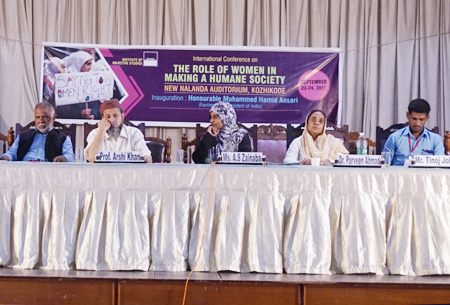
Business Session II
The second business session devoted to “Women’s Participation in Electoral Politics” was chaired by AS Zainaba. The first speaker of the session, Prof. Arshi Khan, Deptt. of Political Science., AMU, disagreed with “euphemisms” like feminism and equality, and said that defining women’s equality was a conceptual problem. He held that barring the election of the President, there was no proportional representation in India. India was the largest democracy of the world, was a statement that could be interpreted in both negative and positive terms. The answer to this question could be positive for those who benefited from it. But it could also be negative at the same time for those who were at a disadvantage, i.e., Muslim women.
He said that the Centre as well as states were duty-bound to see to it that Muslims were empowered.
Dr. Parveen Ahmad, Asstt. Professor, DWE, MANUU, Hyderabad, spoke on “Revisiting the Role of Women in Electoral Politics.” She lamented that India claimed to be an enlightened society, but people were still living in the 15th century. However, she said that it was the 37th Amendment to the Constitution that gave the right of women’s representation in panchayati raj institutions.
Sheikh Nizamuddin, member, IOS General Assembly, Sholapur (Maharashtra), pleaded for according their rightful place to women in society they deserved as mother, wife, sister, daughter. He called for women’s participation in different fields. While Tinoj John spoke on the “Role of Women in Politics: Political Empowerment of Women in Kerala”, Saliha Alpetta, a social activist, also expressed her views on the subject.
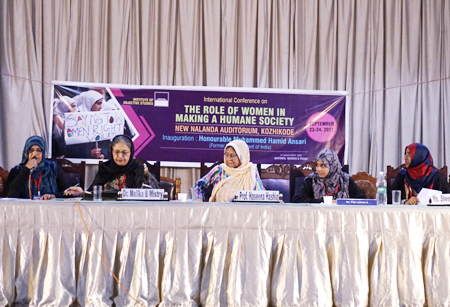
Business Session III
The third and last session of the first day focused on “Role of Muslim Women in Socio-Economic Uplift.” Jameela PK, presided over the session. While Dr Malika B Mistry, Associate Professor, Deptt. of Economics, Poona College of Arts, Science and Commerce, Pune, read her paper on “Role of Muslim Women in Socio-Economic Uplift: Two Case Studies from Maharashtra”, Prof. Haseena Hashia, Deptt. of Geography, Jamia Millia Islamia, presented a paper on “Role of Women in Management.” In her paper, Prof. Hashia complained that women were confined to junior level managerial positions. Unlike India, not only economic changes, but also social attitudes had undergone a sea change in the UAE in the past five decades. While Sahla K presented her paper on “Status and Role of Muslim Women’s Education - A Tool of Women’s Empowerment: A Study Based on Kerala Society”, Fida Lubana A, focused on the “Role of Muslim Women in Socio-economic Uplift”. In her paper, Lubana, hailed Rabia, a woman from Calicut who braved her infirmity caused by polio and cancer, and spread literacy, as a living role model for others to follow. She learnt reading and writing and later took it up as a mission to eradicate illiteracy. She bagged several awards, including one from the Prime Minister, for exemplary work to educate people, she said.
Sahla K presented a paper on “Status and Role of Women’s Education - A Tool for Women in Socio Economic Uplift”, while Sheena Sadique spoke on the topic “Role of Muslim Women in Socio-economic Uplift.”
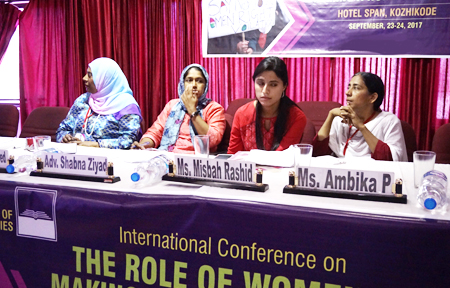
Business Session IV
The second day had five business sessions, including the valedictory session. The first business session, held at Hotel Span in the town had Advocate Shabna Ziyad, a senior journalist from Ernakulum, as chairperson, who spoke in Telugu on the theme “Women and Media”.
Saydoon Nisa Sayed, co-chair, African Women of Faith Network, Durban, South Africa, presented a paper on “Women and Media: Women, Discover all your greatness” Hiba Nabiha A, spoke on “Representation of Women in Audio-Visual Media”. Saydoon Nisa Sayed called for solidarity among women. She said that once about 20,000 women marched in Pretoria against oppression. In Africa, 1994 was a turning point in history when equal opportunities were given to women. Referring to the news coverage in the media, she said that 24 per cent news that appeared was about women.
Owing to portrayal of women in the media, Muslim women faced a lot of difficulty. They were victims of false propaganda that did not portray them as purposeful leaders. She felt that despite gender bias, there was still ample scope for women to enter the media. Negative portrayal of women in media, particularly in the electronic media, had lately increased. Lack of women’s access to the electronic media left much to be desired and government as well as media management should look into it, she observed. Calling for a balanced portrayal of women in the media, she said that they should also be allowed to have a say in production and management.
Hiba Nabiha A, expressed a grouse that women had no voice in Malyali cinema. Despite being in lead roles, they were rarely shown as good Muslims. One of the movies had a character named Ayesha. The film earned Rs. 18 crore at the box office. It showed that a Muslim woman could not be married into a non-Muslim family. The film showed two types of girls. While one girl named Shahana, frequented night clubs, the other Farida wore a veil. It communicated an effort by film makers at reshaping of Muslim women’s identity, she said. She added that women who jettisoned Islamic dress, manners and morals were shown as superior to, and more successful than, those who stood by Islamic values.
Research scholar, Centre for Political Studies, JNU, New Delhi, Misbah Rashid in her paper “Fatwas on Women, Media Prejudice and Stagima”, held that there were two types of fatwas issued by the largest Islamic seminary in the sub- continent, Darul Uloom Deoband. One was the conventional type of fatwa on women and the other was non-conventional, which was related to talaq and blasphemy. The seminary had a separate department of fatwa. She said that 41 percent of the fatwas were related to matters like talaq and khula. Fatwas issued by the Deoband seminary against Sania Mirza and Tasleema Nasrin generated unwanted interest in the media. She termed it as a stereo-typed interpretation of Islam. She stressed the need for better representation of women in the media to dispel misconceptions. Ambika P presented a paper on “Commoditisation of Women and the Media” in Malyalam language.
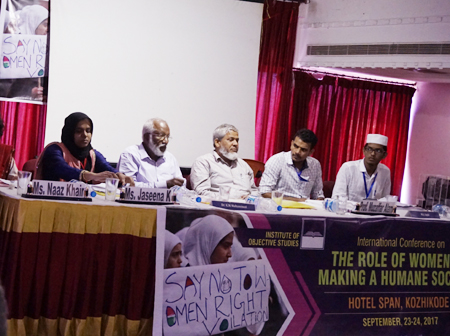
Business Session V
The theme of the fifth session was “Education: Religious and Secular”. The session was chaired by the former professor and HoD, Deptt. of Arabic, University of Calicut, Dr KM Mohammad. Presiding over the session, Dr. KM Mohammad observed that the Qur’an started with the word ‘Iqra’ which meant to read. That referred neither to zakat nor anything else. He underlined the need for acquiring knowledge “even at the cost of undertaking a visit to China”. He said that the intake of girl students in Calicut Engineering College was as much as 65 percent. In other colleges of the town, the enrolment of girl students was as high as 70 percent.
Prof. Muzaffar Alam of the Deptt. of Arab Studies, EFL University, Hyderabad, spoke on “Girl’s Madarsas in Hyderabad: An Objective Assessment”. He said that the history of madarsas in India was as old as the advent of Islam in the country. Education in madarsas, that stretched from Multan to Fatehpur Sikri and Delhi, was confined to upper classes. He said that madarsas for girls started from Rampur (west UP) and reached Maunath Bhanjan (east UP), Lucknow and Malegaon in Maharashtra in the seventies as well as Delhi and Hyderabad. The pioneering work in the field of girls’ education was done by Jamat-i-Islami. Referring to Madarsa Jamiatul Banaat, he said that this seminary imparted religious education along with modern education. Such madarsas could effectively counter the move to convert to Christianity, Qadianism and Baha’ism, he added.
Education activist and researcher from New Delhi, Naaz Khair, presented her paper on “Role of Muslim Women in Educational Development in India” in which she made a reference to several women pioneers of women’s education. In this connection, she mentioned the name of Begum Rokayya of Bengal of undivided India. Rokayya did not receive formal education and learnt to read and write at home. Later she started a school for girls. She was of the belief that women could become agents of social change. She said that the contributions of Savitri Bai Phule, Fatima Sheikh and the Begums of Bhopal were an important milestone in the spread of women’s education.
Research scholar in JNU, MS Sajid, focused on the exclusion of women from madarsas. Calling for modernisation of madarsas, he said that efforts should be made to save the madarsas from radicalisation. He observed that women were equally engaged in the compilation of Hadith and their number ran into hundreds. Between 10th and 15th centuries, there was no distinction between religious and secular education, he said. Jaseena K, Asstt. Professor, Jamia Nadviya Training College, spoke on “Women’s Education in Kerala: Religious and Secular”. Mohd. Shabeeb presented his paper on “Women’s Education: Religious and Secular”.
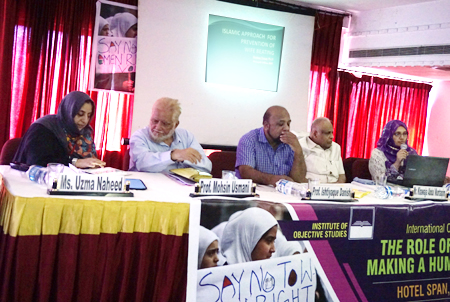
Business Session VI
The sixth business session on “Status of Women in the Muslim World” commenced with Prof. Ishtiyaque Danish in the chair. Khwaja Muntaqim, ex-Director and Additional Legislative Counsel, Government of India, in his paper on “Multifarious Role of Women and Gender Justice in Islam”, hailed Rabia, born in Kerala in 1966, as a hope for those who were engaged in educating the poor. He said that though women constituted half of the population, 66 percent of the work was done by them. However, their participation was a bare 29 per cent in India. He said, to ensure that women enjoy their rights, they must enjoy social, economic and cultural rights. He regretted that despite noteworthy achievements, they were still backward globally.
He observed that the social system in Islam had been praised by the Times (London) in one of its editorials.
Prof. Mohsin Usmani presented his paper on “Status of women in Islam in Comparison with Other Religions”. He said that Islam had given rights to both men and women. As against this, Judaism believed that women must be deprived of their rights. According to Christianity, he observed, a woman was an unavoidable evil. She had been asked to learn the art of obedience. It also treated women as a symbol of slavery.
He said that according to Hindu religion, a woman must not do anything independently. After the death of her husband she should not remarry. It also said that a king and a woman must not be trusted.
But in Islam, he said, women were treated with the dignity and honour they deserved. He observed that it was Islam that gave right to women on par with men.
President, IIWA, Mumbai, Uzma Naheed, who spoke on “Status of Women in Muslim World”, suggested that such seminars should be organised throughout the country. She said that her organisation had been working for the empowerment of women for the last 30 years. While emphasising the need for change in the psyche of people towards women, she said that no country could progress without the participation of women who constituted half of the population. Expressing concern over the payment of low wages to women engaged in different sectors, she informed that her organisation had helped several self-help groups to market the handicraft items they produced.
Dr. Naseema Hasan, Research Fellow, BIIT, Bangladesh, presented her paper on “Islamic Approach to Prevention of Wife Beating: Bangladesh Perspective”. She held that domestic violence was a problem in her country, too. It affected children and the family. She said that Surah Al-Nisa allowed beating the wife lightly in order that she mended her ways, but this had also created some confusion among the ulema. She said that about 17 different meanings had been inferred from the word daraba (used in the Quran), including beating.
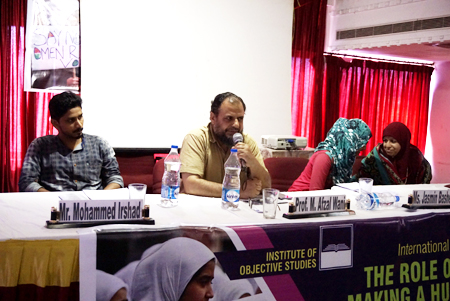
Business Session VII
The seventh session on “Women-Related Laws in Muslim World” was presided over by Prof. Afzal Wani. Jasmin Basheer, who spoke on “Women-Related Laws in the Muslim World”, laid stress on Shariah journalism. She said that both men and women were created equal, but not identical, adding that marriage was a contract between husband and wife in Islam.
Mr. Mohammad Irshad presented his paper on “The Discourse of Muslim Personal Laws and the Media” while Dr. Sharmin Islam spoke on “The Dilemma of an Adopted Child: Bangladesh Perspective”. In his presidential remarks, Prof Wani said that Islam taught us to live with kindness. He observed that matah was a gift to the divorced women. “We should lead our life as faithful followers of the Prophet (PBUH)”, he said. He further said that the media was also influencing the judiciary by playing up issues concerning Muslims.
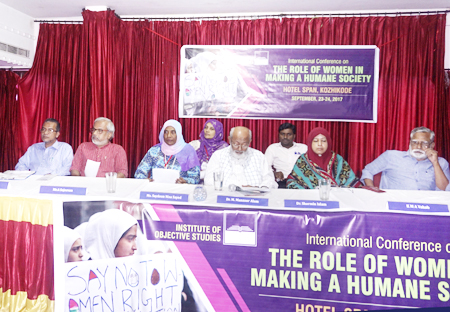
Valedictory Session
While the chairman of IOS, Dr. Mohammad Manzoor Alam, presided over the valedictory session, Saydoon Nisa Sayed, Dr. Sharmin Islam and Dr. Naseema Hasan were guests of honour. Saydoon Nisa Sayed remarked that she saw Islam as the brightest religion. Dr. Sharmin Islam asked Muslims to truly practise Islam in their lives. Dr. Naseema Hasan said, “we are the faithful servants of Allah”.
Dr AI Vilayatullah, Senior Faculty, Deptt. of English, Government College, Malappuram, in his valedictory speech, asked the Muslims to be courageous and bold. The Prophet (PBUH) is the last Messenger of Allah and a role model for all of us. Women were more privileged than men as Jannat was under the feet of the mother. Protection of women could be ensured by providing them with home, clothes, better law and order and taqwa (purity of thought and action). Describing women as celebrated members of society, he said that they were competent enough to assume any role in a civilised society. The Chief Editor, Thejas Daily, Calicut, NP Chekkutty, held that Muslims constituted 30 per cent of the total population in Kerala. He said that despite women constituting 15 percent of the state’s population, girls were not being given the opportunity in the field of journalism. The Executive Editor, Suprabhatam daily, Calicut also spoke on the occasion.
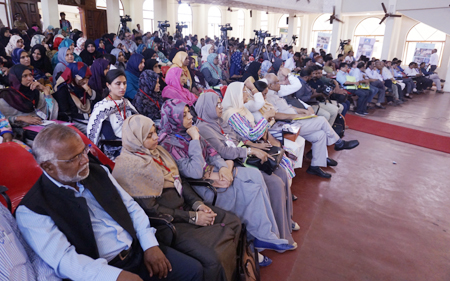
An eight-point resolution unanimously adopted by the delegates was read out by Sharafuddin. In his presidential speech, Dr Mohammad Manzoor Alam asked the delegates to closely read the resolution and send suggestions for its implementation. He said that Kerala assumed special importance in respect of its Muslim population as also the role being played by Muslim women of the state. Earlier also, a function held at Calicut was very successful. He announced that the lectures delivered by the participants at the conference would be published by the IOS in book form. The participants were asked by him to send their papers read at the two-day seminar to the Institute by December 30. They would also be reminded by his office to send their papers. He also announced to set up a library in Calicut. The library would have books on gender studies as also the literature on challenges before Islam with special reference to Kerala.
The two day conference concluded with vote of thanks extended by KMA Vahab, chair for Islamic Studies and Research, University of Calicut.
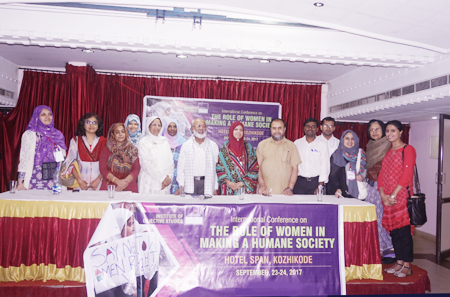
Following is the 8-point Resolution adopted at the conference:
1. Despite notable progress made by women in various fields, the fact is that a huge majority of them is facing innumerable disadvantages which deprive them of opportunities to fully realise their potentials and contribute to the development of their societies scattered across the globe. This two-day international conference, therefore, urges all concerned to join hands with women’s groups and enable them to play their due role in creating a just, compassionate and humane global society in which truth and equality would prevail.
2. Normatively, Islam has given a high status to women, but the reality of women in Muslim societies is not up to mark. This conference, therefore, urges Muslim leaders, intellectuals and academics to try to narrow down the gap between the Islamic ideals and the lived reality of Muslim societies today and empower women to be equal partners in development of a humane society.
3. This conference resolves and urges all concerned to facilitate education of Muslim women, to end gender discrimination and disparities which, over the decades have crept into Muslim societies. Muslim women’s groups are also urged to engage with women of other faiths and seek their co-operation in such noble endeavours.
4. World bodies should be urged to follow the promises, pledges and guiding principles as per the 1995 Beijing Declaration and 1992 Rio Declaration, the UN Security Council Resolution 1325 and other international instruments religiously to associate women with the cause of boosting literacy, protecting environment, improving public health, improving quality of life, advancement of peace, augmentation of international co-operation, addressing the issues of underdeveloped nations and promotion of international trade.
5. Recognition of vital and noteworthy roles of women, more than fourteen centuries earlier by the Quran and Prophet Muhammadsaw should be well appreciated by the global community in general and Muslims of the world in particular and to be followed with divine sanction.
6. The increasing participation of Muslim women in national and international jurisdictions should be better facilitated by the creation of a supportive environment through policy and legislation.
7. In India, government and non-governmental organisations should especially provide institutional assistance to such Muslim women for education and skill development who had not been so far able to avail of the benefits of the existing schemes and facilities made available by the Central and state governments.
8. Taking a step towards empowering Muslims, the Institute of Objective Studies announces to set up Hadhrat Ayesha Library and Centre for Gender Studies at Calicut, which will seek to serve the purpose for which this conference has been convened.
|